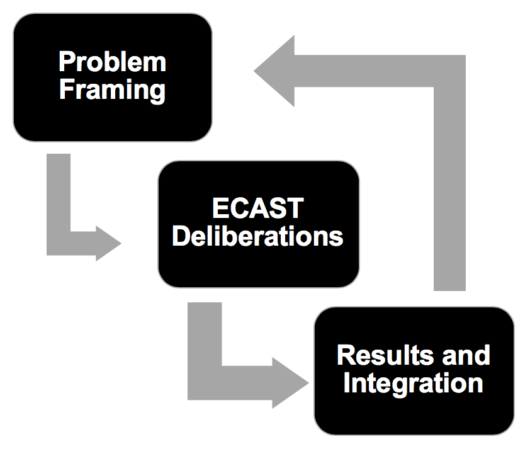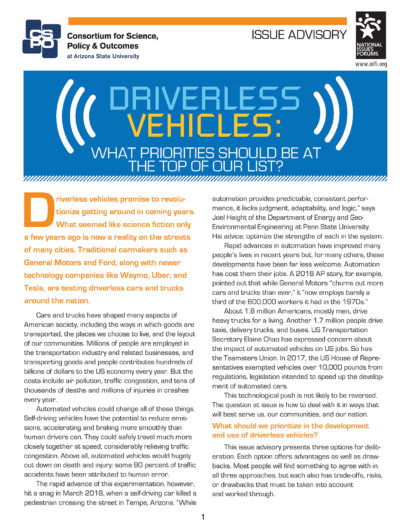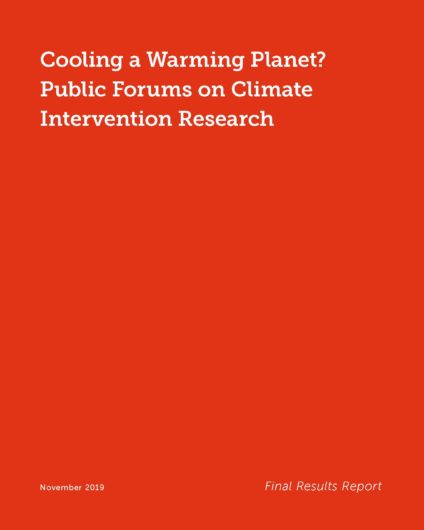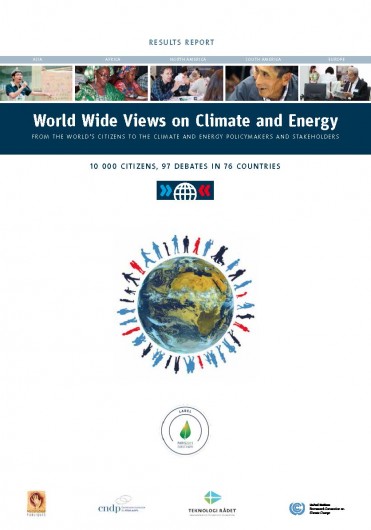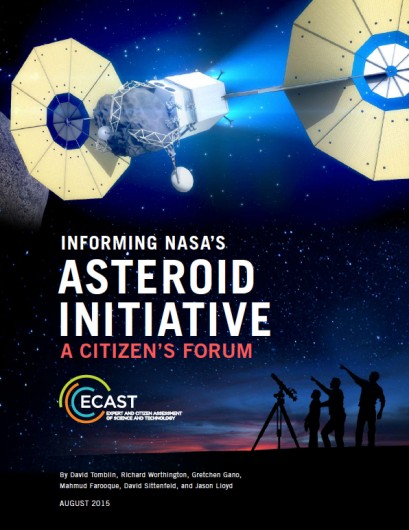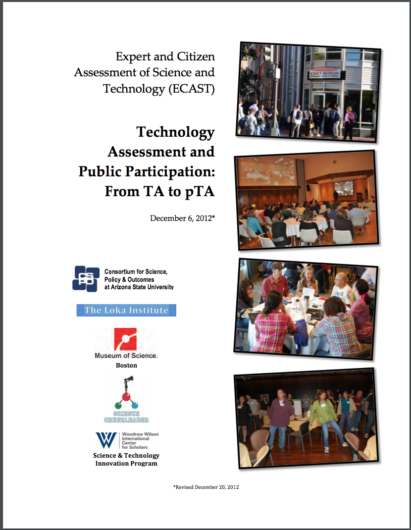Participatory Technology Assessment
Participatory technology assessment (pTA) refers to a class of methods to integrate new voices into science policy discussions. This class of methods encompasses various forms of public deliberation including citizens’ assemblies, citizens’ juries, and consensus conferences. ASU Consortium for Science, Policy & Outcomes is a founding member of the Expert and Citizen Assessment of Science and Technology (ECAST) network which brings together academic research, informal science education, citizen science programs, and non-partisan policy analysis to engage citizens.
The three phases, briefly described below, change slightly depending on each project’s unique technical, social, and political contexts. Further, this method is intended as a “living” method. We developed the ECAST model over the course of a decade of project work and intend to continue developing it in light of evolving academic theories and changing policy contexts.
ECAST pTA Method
1. Problem framing
We use two participatory activities to construct a balanced issue framing. We recognize that public concerns may not always align with those of experts and that an expert-designed series of questions can miss latent areas of public concern. We thus begin our issue-framing process through use of open-framing focus groups. During these focus groups, we provide 10-15 recruited members of the public with minimal background information and ask them about their hopes and concerns regarding an issue. We then combine these public perspectives with expert framings extracted from a review of the academic literature and elicitation of expert and stakeholder perspectives during a stakeholder design workshop.
2. ECAST Deliberation
Derived from the Danish Board of Technology’s World Wide Views method of deliberation, ECAST deliberations consist of day-long, informed deliberations with 80-100 members of the public. These deliberations are:
Informed: Participants receive informational briefing packets reviewing the technical aspects, salient issues, questions, and areas of uncertainty related to the topic prior to the deliberation. We also introduce additional information and considerations throughout the day via themed videos and deliberation materials. In some of our projects, we include experts during the deliberation activity in a limited and mediated fashion to provide participants additional information.
Diverse: We recruit participants using online and traditional methods of recruitment. We do not make any claims of, nor do we prioritize, statistical representation. While census data guide our recruitment, we ultimately strive for diversity, bringing together a critical mass of diverse demographic groups to represent a cross-section of the population of the city or state in which the deliberation takes place.
Interactive: We design the deliberations in collaboration with science museums to make sure they are accessible and engaging. In addition to discussions, groups review “stakeholder cards” and complete group activities.
General format: Participants sit at tables with 6-8 other individuals and a trained facilitator who guides them through the day’s discussions. The deliberation day is broken up into multiple thematic sessions. The general format for a session is: 1) watch a short briefing video, 2) engage in a table discussion regarding the session topic, and 3) complete a group activity and individual worksheet.
Local sessions: When hosting deliberations in multiple locations, all but one of the thematic sessions is the same for the different locations to allow for cross-site comparison. This exception is a local session that is unique to each site. These local sessions are designed in collaboration with, and explore issues of interest to, local stakeholders.
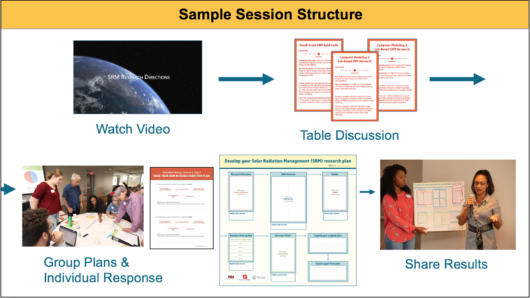
3. Results integration
We collect both quantitative and qualitative data regarding public values and rationales.
Qualitative data:
- Individual written rationales
- Group written rationales
- Table observer notes
- Audio table recordings (also transcriptions for some projects)
Quantitative data:
- Pre- and post-surveys
- Individual worksheet Likert-scale (five or seven point scale ratings expressing level of agreement or disagreement with a statement) ratings and rankings
- Group ranking exercises
- Demographic data
We analyze these data using traditional methods of open and thematic coding. We also conduct basic quantitative analysis, calculating means and distributions, as well as two-sample t-tests (or ANOVA analysis) to compare means between sites. We do not use these analyses to make any statistical extrapolations from our participant groups to the population at large. Our statistical work is only to make sense of the data generated by the deliberations and to provide a general sense of the effectiveness of the forum.
Since we collect more data than we can analyze in their entirety, we host a preliminary results workshop to solicit expert and stakeholder input on areas for deeper analysis. This process helps to ensure the outputs of our deliberations are useful to policy and decision makers.
For more information regarding the ECAST pTA method, please contact Mahmud Farooque at [email protected].
Building Informed and Involved Communities for Responsible Marine Carbon Dioxide Removal – A Workshop Series (2024 – Present)
 There is an urgent need to define the community engagement challenges in research and development of marine carbon dioxide removal (mCDR), map potential solution pathways and identify roles and responsibilities for public, private and not-profit stakeholders. The workshop series that will engage multi-sectoral actors involved in research, testing, development, and deployment of mCDR with community engagement scholars and practitioners in relevant domains to help co-develop a roadmap for building informed and involved communities through engagement and information sharing. Two workshops are envisioned over a twelve-month period. The first workshop will socialize state of the science on community building and define the challenges. The second workshop will identify opportunities and the solution pathways and map responsibility for each sectoral actor.
There is an urgent need to define the community engagement challenges in research and development of marine carbon dioxide removal (mCDR), map potential solution pathways and identify roles and responsibilities for public, private and not-profit stakeholders. The workshop series that will engage multi-sectoral actors involved in research, testing, development, and deployment of mCDR with community engagement scholars and practitioners in relevant domains to help co-develop a roadmap for building informed and involved communities through engagement and information sharing. Two workshops are envisioned over a twelve-month period. The first workshop will socialize state of the science on community building and define the challenges. The second workshop will identify opportunities and the solution pathways and map responsibility for each sectoral actor.
Read more about the project here.
Shared Principles for Community Collaboration in West Calcasieu Parish (2023 – Present)
 Shared Principles for Community Collaboration (Shared Principles) is a community engagement process designed to help project developers and funders collaborate with community members on local energy projects. The Consortium for Science, Policy & Outcomes at Arizona State University (CSPO) is currently leading a Shared Principles process for a direct air capture project, called Project Cypress, located in Vinton, Louisiana. We know each community is different. Shared Principles is meant to help us learn about what matters to residents living near Project Cypress, so the Office of Clean Energy Demonstrations (OCED) and Project Cypress can implement a community engagement process that best serves communities’ goals and needs. Shared Principles is a way for OCED and Project Cypress to hear directly from community members about how they would like for Project Cypress to engage them throughout the project
Shared Principles for Community Collaboration (Shared Principles) is a community engagement process designed to help project developers and funders collaborate with community members on local energy projects. The Consortium for Science, Policy & Outcomes at Arizona State University (CSPO) is currently leading a Shared Principles process for a direct air capture project, called Project Cypress, located in Vinton, Louisiana. We know each community is different. Shared Principles is meant to help us learn about what matters to residents living near Project Cypress, so the Office of Clean Energy Demonstrations (OCED) and Project Cypress can implement a community engagement process that best serves communities’ goals and needs. Shared Principles is a way for OCED and Project Cypress to hear directly from community members about how they would like for Project Cypress to engage them throughout the project
Read more about the project here.
Participatory Assessment and Governance of Climate Intervention Technologies (2023 – Present)
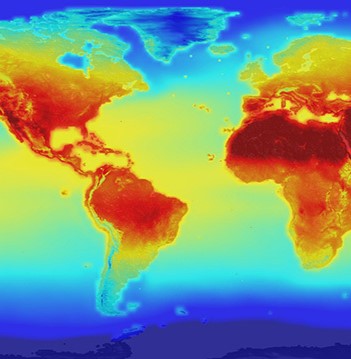 Climate intervention technologies (CIT) include several existing, proposed, theoretical, or experimental technologies, including carbon dioxide removal and solar radiation management technologies, that aim to modify Earth’s climate systems to reduce the harms of climate change (IPCC, 2018; The Royal Society, 2018). Projected climate models suggest that these technologies may be necessary to achieve the international community’s ambition of staying below a 2°C increase in global temperatures (IPCC, 2018; AGU, 2022). However, there remains a high degree of uncertainty about whether such technologies would work at scale, who would benefit and who would suffer from their deployment, where they might be located, what their effects would be on surrounding populations, and what their impact would be to those already most vulnerable in society. As such, this one-year project will explore and articulate the needs, opportunities, resources, organizations and partnerships for designing a global research center for participatory, inclusive, and responsible governance of Climate Intervention Technologies. Additionally, this project seeks to expand and adapt participatory technology assessment (pTA) as an overarching framework for integrating scientific research with societal needs and public value.
Climate intervention technologies (CIT) include several existing, proposed, theoretical, or experimental technologies, including carbon dioxide removal and solar radiation management technologies, that aim to modify Earth’s climate systems to reduce the harms of climate change (IPCC, 2018; The Royal Society, 2018). Projected climate models suggest that these technologies may be necessary to achieve the international community’s ambition of staying below a 2°C increase in global temperatures (IPCC, 2018; AGU, 2022). However, there remains a high degree of uncertainty about whether such technologies would work at scale, who would benefit and who would suffer from their deployment, where they might be located, what their effects would be on surrounding populations, and what their impact would be to those already most vulnerable in society. As such, this one-year project will explore and articulate the needs, opportunities, resources, organizations and partnerships for designing a global research center for participatory, inclusive, and responsible governance of Climate Intervention Technologies. Additionally, this project seeks to expand and adapt participatory technology assessment (pTA) as an overarching framework for integrating scientific research with societal needs and public value.
Read more about the project here.
Arizona Consortium for Community Engagement, Innovation, and Learning on Consent-Based Siting (2023 – Present)
 The United States has been wrestling with the management of spent nuclear fuel for over seventy years and still has no long or short term storage or disposal facilities. This has left nuclear power plants with no choice but to manage their own high-level waste on site, costing taxpayers millions and invoking serious environmental justice concerns for surrounding communities that did not consent to nearby long-term waste storage. As such, this project resurrects and expands upon the original ECAST project on a state-wide scale to provide insights into how one state can offer a representative view on nuclear technologies and their byproducts, as well as demonstrate how a state has a unique relationship to nuclear technologies that need to be considered in consent-based siting.
The United States has been wrestling with the management of spent nuclear fuel for over seventy years and still has no long or short term storage or disposal facilities. This has left nuclear power plants with no choice but to manage their own high-level waste on site, costing taxpayers millions and invoking serious environmental justice concerns for surrounding communities that did not consent to nearby long-term waste storage. As such, this project resurrects and expands upon the original ECAST project on a state-wide scale to provide insights into how one state can offer a representative view on nuclear technologies and their byproducts, as well as demonstrate how a state has a unique relationship to nuclear technologies that need to be considered in consent-based siting.
Read more about the project here.
Establishing a Sociotechnical Approach to Fusion Energy Development (2023 – Present)
 No energy technology is perfectly equitable, and the deployment of any new technology – energy related or otherwise – entails a multidimensional, differential, and dynamic distribution of benefits and burdens in society. As such, this project – a joint effort between the University of Wisconsin-Madison, the University of Michigan-Ann Arbor, and Arizona State University CSPO – is a preliminary exploration into societally informed sociotechnical development approaches for fusion energy systems. Evidence-based community engagement is vital for the sustainable development and deployment of fusion technologies sensitive to benefit and burden distributions.
No energy technology is perfectly equitable, and the deployment of any new technology – energy related or otherwise – entails a multidimensional, differential, and dynamic distribution of benefits and burdens in society. As such, this project – a joint effort between the University of Wisconsin-Madison, the University of Michigan-Ann Arbor, and Arizona State University CSPO – is a preliminary exploration into societally informed sociotechnical development approaches for fusion energy systems. Evidence-based community engagement is vital for the sustainable development and deployment of fusion technologies sensitive to benefit and burden distributions.
Read more about the project here.
Carbon Dioxide Removal (2022 – Present)
 Scientists, philanthropies, and governments around the world are demonstrating a growing interest in a new set of tools aimed at the ongoing fight against climate change. Rather than focusing solely on reducing new emissions of carbon dioxide – a greenhouse gas that contributes significantly to climate change – carbon dioxide removal technology (CDR) holds theoretical promise in scrubbing carbon dioxide from the atmosphere, thus reducing the concentration of existing greenhouse gasses contributing to the problem. Despite this, many of the details about the deployment, safety, and effectiveness of these technologies are unknown. As such, this project aims to bring the voices of the public into discussions about the development and utilization of CDR technology. With generous funding from the Alfred P. Sloan Foundation, CSPO will join forces partners at the University of Calgary, the Boston Museum of Science, the University of Maryland, and a variety of local partners across the United States and Canada to gather the thoughts, hopes, and concerns of everyday citizens on CDR technology and to explore pathways for integrating their perspectives into CDR governance.
Scientists, philanthropies, and governments around the world are demonstrating a growing interest in a new set of tools aimed at the ongoing fight against climate change. Rather than focusing solely on reducing new emissions of carbon dioxide – a greenhouse gas that contributes significantly to climate change – carbon dioxide removal technology (CDR) holds theoretical promise in scrubbing carbon dioxide from the atmosphere, thus reducing the concentration of existing greenhouse gasses contributing to the problem. Despite this, many of the details about the deployment, safety, and effectiveness of these technologies are unknown. As such, this project aims to bring the voices of the public into discussions about the development and utilization of CDR technology. With generous funding from the Alfred P. Sloan Foundation, CSPO will join forces partners at the University of Calgary, the Boston Museum of Science, the University of Maryland, and a variety of local partners across the United States and Canada to gather the thoughts, hopes, and concerns of everyday citizens on CDR technology and to explore pathways for integrating their perspectives into CDR governance.
Read more about the project here.
Human Genome Editing (2019 – 2022)
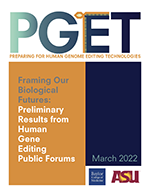 This project aims to bring the voices of the public into discussions about human genome editing through three connected projects. In partnership with the Kettering Foundation, CSPO is developing an issue guide that can be used for community-based, deliberative conversations about human genome editing. Using our pTA method, the project team will draw on themes from the issue guide to help inform the design of a series of large-scale public deliberations on human genome editing. The deliberations are part of a larger project that aims to develop forward-looking, democratically derived, and ethically reflective processes useful in preparing for possible futures related to human genome editing. CSPO will also incorporate outputs from the deliberations into a Global Citizens’ Assembly on Genome Editing.
This project aims to bring the voices of the public into discussions about human genome editing through three connected projects. In partnership with the Kettering Foundation, CSPO is developing an issue guide that can be used for community-based, deliberative conversations about human genome editing. Using our pTA method, the project team will draw on themes from the issue guide to help inform the design of a series of large-scale public deliberations on human genome editing. The deliberations are part of a larger project that aims to develop forward-looking, democratically derived, and ethically reflective processes useful in preparing for possible futures related to human genome editing. CSPO will also incorporate outputs from the deliberations into a Global Citizens’ Assembly on Genome Editing.
Read more about the project here.
Automated Mobility Futures (2018 – 2019)
To provide a platform for community members to engage with decision makers about driverless vehicles, CSPO and the Paris-based Missions Publiques launched an unprecedented program of public consultation. Our Driverless Futures was part of an international collaboration led by Missions Publiques to bring together the voices of hundreds of individuals in public forums across cities in North America, Europe, and Asia. Informed, deliberative, and neutral, these forums generated critical information for decision makers to prepare for the future of driverless mobility. Our Driverless Futures built on previous project work sponsored by the Kettering Foundation aimed at understanding the public’s top priorities with respect to automated vehicles.
Read more about the project here.
Climate Intervention Research (2017 – 2019)
In light of political and technological difficulties of meeting climate change mitigation targets, a third response to climate change has gained increased interest: intentional manipulation of the climate to reduce the negative impacts of warming, or geoengineering. By engaging with diverse groups of lay citizens, the project team aimed to understand whether and how reasoned deliberation among citizens could usefully inform geoengineering research governance. The project team also studied how public input influences the way scientists, funders, and other stakeholders approach geoengineering research. By working with citizens to develop a balanced framing of the profound questions raised by geoengineering research, this project also sought to help experts and decision makers benefit from the insights and priorities of the public.
Read the final project report here.
Climate Resilience (2015 – 2018)
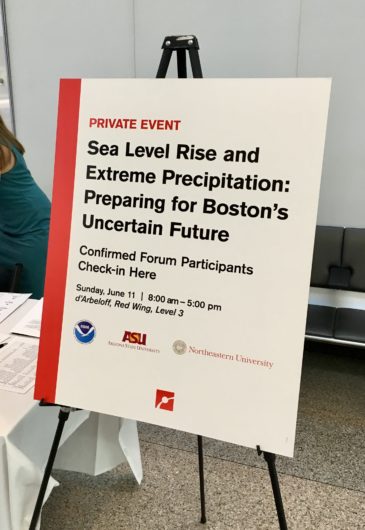
Funded by the National Oceanic and Atmospheric Administration (NOAA) Office of Education (OED) and led by CSPO and the Museum of Science Boston, this three year project created a next-generation, replicable institutional model for strengthening community resilience to a variety of hazards. The project team engaged lay citizens to discuss the hazards they face and improve public awareness of these hazards; increased the capacity of museums as convening institutions for public engagement; incorporated the coastal, weather, and climate science needed to inform decisions; and involved the public directly in decisions about measures that contribute to resilient communities, ecosystems, and economies. The process generated materials and methodologies, along with a support network of experienced facilitators, that museums and schools could use for future programs and informal science education (ISE) to increase environmental science literacy and strengthen community decision-making.
Read more about the project here.
World Wide Views on Climate and Energy (2015)
World Wide Views on Climate and Energy (WWViews on Climate and Energy) was a global citizen consultation providing unique information about how far citizens around the world are willing to go in order to deal with climate change and to bring forward an energy transition. As part of this international project, CSPO organized four citizen deliberations in the United States. Citizens expressed their views on an identical set of questions, designed to reflect policy controversies at the global COP climate negotiations and political discussions about climate and energy in general. The results were published in real-time via a web-tool, allowing for easy exploration and comparisons of results (one country with another, developed countries with developing, etc). A summary results report was released on September 26, 2015 at New York at a side event during the UN General Assembly meeting.
Read more about the project here.
Planetary Defense (2014)
This project served as the pilot project for the newly established ECAST network. ECAST partners worked collaboratively with NASA to design, test, develop, implement, analyze, and assess two in-person and one online citizen deliberations for collecting informed public views on NASA’s Asteroid Initiative. The one-day in-person deliberations were hosted in Boston and Phoenix. The online forum was six weeks in duration and involved self-selected participants. The public views on the Asteroid Initiative collected from the forums and the assessment report provided input to early stage planning of the Asteroid Initiative and NASA’s other engagement activities.
Read the project final report here.
World Wide Views Biodiversity (2012)
ECAST’s first large scale project was coordination of the U.S. component of the World Wide Views on Biodiversity. The WWViews Biodiversity global citizen consultation, conducted in 25 countries on September 15, 2012, provided input to the Eleventh Council of Parties of the UN Convention on Biological Diversity (CBD) that took place the following month.
Read the project final report here.
